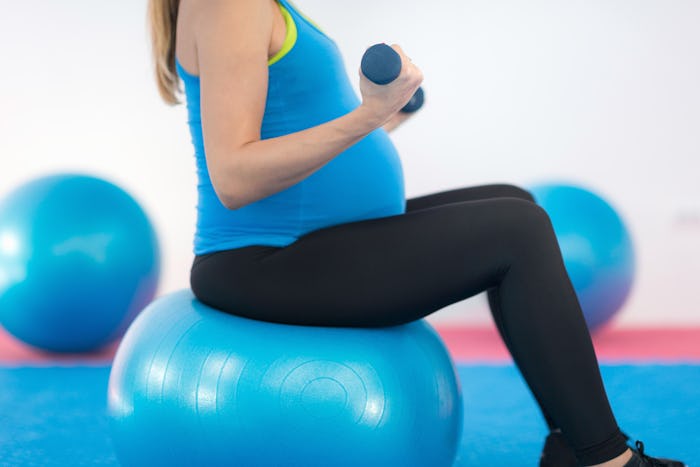Life

The majority of pregnant women are encouraged to get some exercise. Keeping up a regular exercise routine while pregnant can relieve some of the annoying symptoms, while making delivery and recovery a whole lot easier. But if you're a mom-to-be who loves strength training, the first question you probably asked your doctor was, "Can you lift weights while pregnant?"
This may seem like an absurd question for people in your parents' and grandparents' generations. In the past, pregnant women were expected to sit back, relax, and eat for two. Even though many middle- and lower- income families couldn't afford the luxury of a nine month vacation, it was still considered ideal for a mom-to-be to rest. But today, according to Parents magazine, doctors recommend that moms-to-be with normal pregnancies continue their exercise routines.
Noam Tamir, certified trainer and founder of TS Fitness, tells Romper that if you have been doing resistance training leading up to your pregnancy, you should be fine to continue your routine unless your doctor specifically forbids it. He adds that most doctors tell pregnant women not to exercise with more than 25 pounds of weight, however there is no proven data that lifting more puts your pregnancy at risk. Dr. Bruce K. Young, co-author of Miscarriage, Medicine & Miracles and professor of obstetrics and gynecology at New York University School of Medicine agrees, telling Parents magazine that there is no real evidence that exercise is linked to miscarriage.
That being said, many doctors are still cautious. Dr. Raul Artal, M.D., lead author of the American College of Obstetricians and Gynecologists' (ACOG) guidelines for exercise and pregnancy, told Women's Health magazine that it’s generally safe for pregnant women to lift up to 30 pounds of weight (or one 15-pound dumbbell in each hand). But he warned that lifting heavier weights diverts blood flow temporarily from your internal organs to your muscles, which could prevent nutrients and oxygen from getting to the baby.
Similarly, certified strength and conditioning coach Tilita Lutterloh tells Romper that lifting weights that are too heavy can cause you to bear down or hold your breath, which can lead to cramping since the flow of oxygen is being disrupted. She suggests that you talk to your trainer about making modifications to your routine that will suit you best during this time, for example, switching up your stance or weight-lifting positions. Lying flat on back, bending over, and lying flat on stomach are all body positions that can put you and your baby at risk for injury.
Even if you feel comfortable continuing your strength training and your doctor gives you the OK, there will come a point in your pregnancy where you may want to lower your load. Tamir says that for some women in the third trimester, increased hormone production and fatigue can make lifting heavy weights risky.
Although you don't want to lose all of the hard work you've put into training pre-pregnancy, your goals when expecting a baby may have to shift a little. Tamir suggests the following fitness goals during pregnancy: core integrity with a strong pelvic floor; muscular and postural endurance; and body awareness. You should also keep an eye on the intensity of your workout when you're pregnant. If you can't communicate verbally while doing an exercise then the intensity is too high.
Finally, stay safe while in the gym. Lutterloh warns that gyms can often look like an obstacle course. A pregnant woman should try to set up her workouts in an area where there isn't too much going on if possible. "Other gym goers are often in their own world and not paying attention to what's going on around them," she says. Look out for and avoid patrons who throw down heavy weights and move benches around in order to avoid being injured.